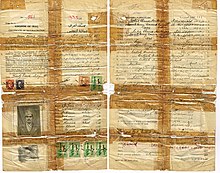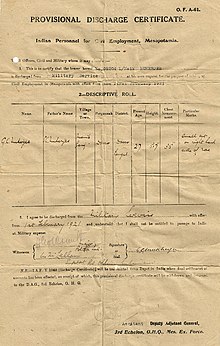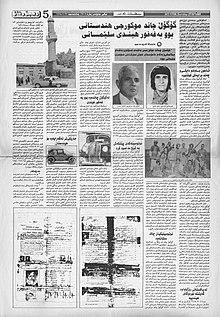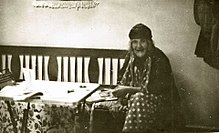Gokul Chand Mukerji
Gokul Chand Mukerji | |
|---|---|
گۆکول چاند مکورجی | |
 | |
| Born | 1894 |
| Died | 18 December 1980 (aged 85–86) |
| Spouses |
|
| Children |
|
| Signature | |
Gokul Chand Mukerji (Kurdish: گۆکول چاند مکورجی;[1] 1894 – 18 December 1980)[2] was an Indian mechanic, driver, driving instructor, and a soldier in the British army.[3] His rank was of a sepoy.[4] He was sent to Iraq during the first world war as a British-Indian soldier.[3] He was the first person to bring a car into the city of Sulaymaniyah – Iraq. Also, he was the first driving instructor in the same city.[5] He held British-Indian nationality.[1] He received the Kingdom of Iraq’s certificate of naturalization in 1932.[1] Later in 1936, he received the Iraqi nationality copybook.[6]
Early life
[edit]
Mukerji was born in Manikganj District, Dhaka, Bengal, British Raj (present Bangladesh) in 1894.[1] The exact day and month of his birth remains unknown to this day. Dhaka was a part of the Indian subcontinent then. His mother, Sugni Sada, was born in 1850 and his father, Sankar Jand Mukerji, was born in 1842.[1] His father was a policeman. Due to his job, he moved to Gaya city.[2] Gokul Chand was the ninth child and the youngest of his family, having seven brothers and a sister.[3] He finished primary school in Gaya.[2] During his early childhood, his parents and some of his brothers died by the plague.[2]
Career
[edit]

After the tragedy of losing his parents and some of his brothers, Mukerji moved to Patna, to live with some relatives. The relatives were poor so he was forced to work from an early age.[5] His first job was as a night watch at a directorate. His next position was as a petition clerk at the central post office, Gaya. His next job was as a ticket collector for trams. Later, on 5 February 1918, at the age of 24, he joined the British army as a sepoy.[4][3] He was sent to Rawalpindi to take driving and mechanic courses.[5] He was sent to Iraq in 1918.
In March 1919, he was sent to Sulaymaniyah from Baghdad upon Major Ely Bannister Soane's request.[2] In Salihi Rasha's book of Sulaimaniyah city, he describes it this way:
"As we mentioned, in 1919 Major Soanne became the political officer of Sulaimaniyah city. He had two Indian drivers. because these two drivers left their damaged cars near Tasluja and Kandakawa destrict near Sulaimaniyah and failed to fix them, he punished both of them and sent them back to Baghdad while requesting for a very good driver who is also a very good mechanic and can speak a good English.
Meanwhile, there was a young Indian mechanic coming to Baghdad. He was going back and forth between his duty station which was the Indian force base (Rasheed air force base) to Bab Al-Moatham per his orders. Because this young man had a very good heart and gave rides to any women or children he found on his way, his hard hearted supervisor disliked this manner. As the Major Soanne's request arrived to the station, this supervisor called for the Indian young man and told him "I gave your name my good-hearted soldier to my supervisors, so they send you to a very disciplined and hard-hearted officer who is also very far away from Baghdad". Therefore after a few days, Gokul Chand Mukerji moved to Sulaimaniyah from Baghdad."[7]
He was discharged from military service at his request and became a private citizen effective on 1 January 1921.[8] Although the English army left Sulaymaniyah in 1922, he stayed there.[2]
Mukerji gave his car as a gift to Sheikh Mahmud when he became the king of Kurdistan. Then he became his driver per Mahmud's request.[7] Although the date of his resignation from being Sheikh Mahmud's driver is not known or confirmed to this date, but later on he started working as a freelance driver on the road between Halabja and Sulaimaniyah.[9]

Mukerji requested for cancellation of his driving license that was valid until 31 March 1969. The date of his request is not confirmed, only the mentioned validity of his license number is mentioned.[10]
Moving to Iraq and Sulaymaniyah
[edit]
Mukerji was sent to Iraq on 11 March 1918. This date was recorded in his "Record of Movement" as the "Date of embarkation for field service"; otherwise, it is also stated that the "Date of leaving station for field station" is 4 March 1918.[11] He was sent to Basra, then Kirkuk, and then Baghdad.[12] He was appointed as a driver of the Rasheed air force base. It was called "Indian force base" then.[12]
In the same year, Major Ely Bannister Soane, who was the political officer of Sulaymaniyah, had two Indian drivers. Their cars were irreparably damaged on the road of Tasluja and they left them there. This angered Major Soane, so he sent them back to Baghdad and requested a good driver and mechanic who can speak English.[2] When this request arrived at the Indian force base, the supervising officer called for Mukerji.[2]
A few days later, Mukerji was sent to Sulaymaniyah. He fixed one of the broken cars with pieces from the other one and towed the broken one into Sulaymaniyah city. Major Soane praised his wittiness and ordered that a course of driving shall be held in Sulaymaniyah by Mukerji. In March 1920, the course was held in Muhandis-khana.[12]

On 1 January 1921, Mukerji was discharged from service at his request and became a private citizen.[8] He bought some new cars and put them to work between Sulaymaniyah-Kirkuk, Kirkuk-Erbil, and Kirkuk-Kifri. During this time, he befriended Sheikh Mahmud Barzanji and his cousin Hapsa Naqib. Mukerji gave his car as a gift to Sheikh Mahmud, but he paid him back for it and requested that he become his driver.[7] Sheikh Mahmud could not pronounce "Gokul Chand Mukerji" very well, so he gave him the nickname of "Ghafur Hindi" or "Ghafura Rash" (the black Ghafur).[7] He was, thereafter, known by this nickname. In late 1968, he retired from work.[5]
Personal life
[edit]


Mukerji married three times. His first name wife was Haba Khan, they were together for a short period of time as she died soon after the wedding. His second wife's name was Amina, they had a daughter (Sabiha), and were divorced later. On 25 August 1925, he married Khairiya Aiyub Ghaiyub, a woman from Kirkuk and they stayed together until his death. They had a daughter, (Shukriya Mukerji) and a son, (Kamal Mukerji).[5][3] Gokul Chand Mukerji lived in the alley of Sabunkaran in Sulaymaniyah, but moved to Ali Naji alley in 1970. He died on 18 December 1980[2] and Khairiya died in August 1984. Mukerji's resting place is in Saiwan cemetery in Sulaymaniyah.
Mukerji was a big fan of Rabindranath Tagore and he memorized many of his works.[12] He was fluent in Hindi, Sanskrit, Arabic, Kurdish, English, Persian and Turkish.[5]
References
[edit]- ^ a b c d e Certification of Naturalization No. 963 Form No. 6 – 1932. Kingdom of Iraq
- ^ a b c d e f g h i Salihi Rasha, Akram Mahmud (1987). Sulaimaniyah city, 200 years. Baghdad, Iraq: Ministry of culture, Kurdish culture and publishing center. Series 165. p. 506.
- ^ a b c d e Karim Mahmud, Abdulla (2 September 1998). "The Indian Gokul Chand Mukerji became the Ghafur Hindi of Sulaimaniyah". Kurdistani Nwe. 1706: 5. Archived from the original on 6 July 2018. Retrieved 21 November 2017.
- ^ a b Indian Soldiers Pay Book, No. 052024, Issued in 1918, Page 4
- ^ a b c d e f Haji Aziz, Kawa (5 March 1999). "Gokul Chand Mukerji the first driver and mechanic and driving instructor in Sulaimaniyah". ِAl-Itthad. 308: 4.
- ^ Copybook of Nationality for men, No. 2012, Issued on 29 April 1936. The Government of Iraq.
- ^ a b c d Salihi Rasha, Akram Mahmud (1987). Sulaimaniyah city, 200 years. Baghdad, Iraq: Ministry of culture, Kurdish culture and publishing center. Series 165. p. 508.
- ^ a b Provisional discharge certificate – Indian Personnel for Civil Employment, Mesopotamia. O.F. A-61.
- ^ Salihi Rasha, Akram Mahmud (1987). Sulaimaniyah city, 200 years. Baghdad: Ministry of culture, Kurdish culture and publishing center. Series 165. p. 510.
- ^ GC Mukerji Request for cancellation of Driving license
- ^ Indian Soldiers Pay Book, No. 052024, Issued in 1918, Page 5
- ^ a b c d Salihi Rasha, Akram Mahmud (1987). Sulaimaniyah city, 200 years. Baghdad, Iraq: Ministry of culture, Kurdish culture and publishing center. Series 165. p. 507.
